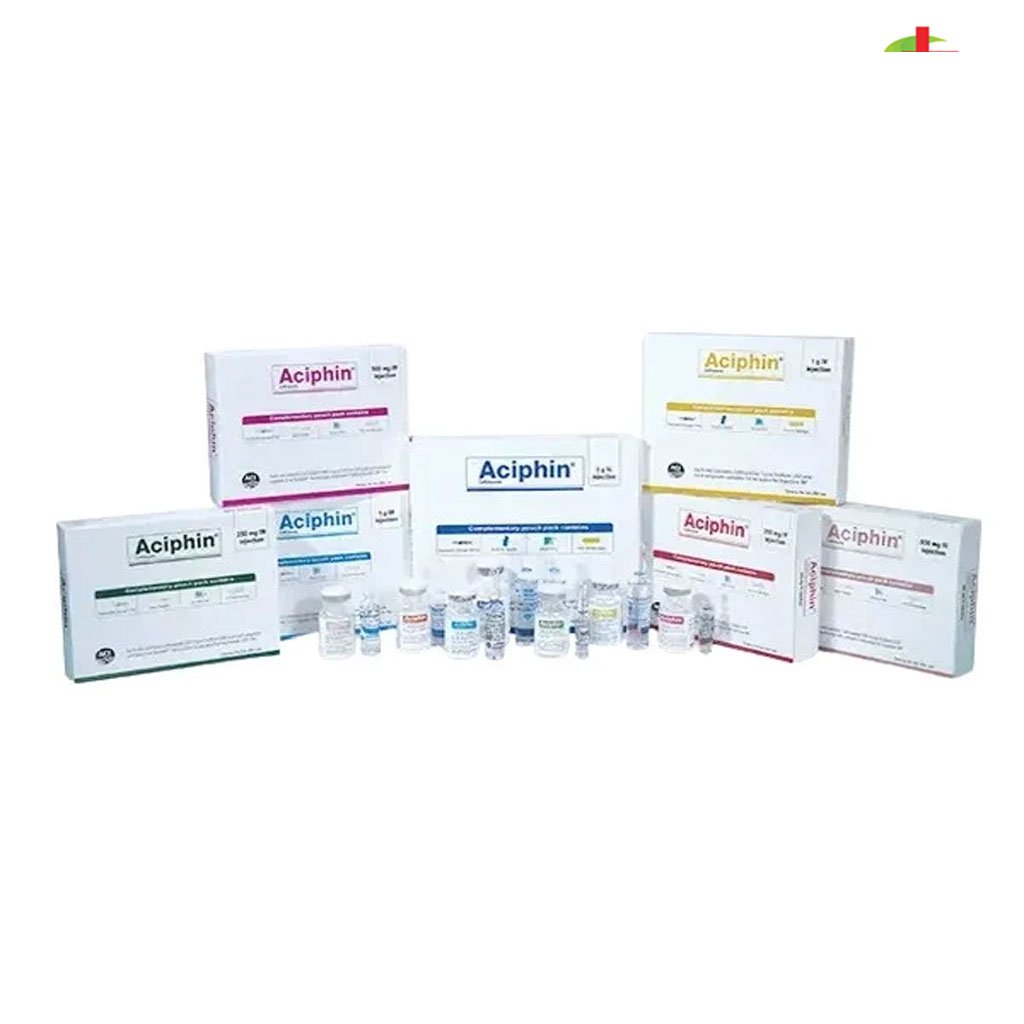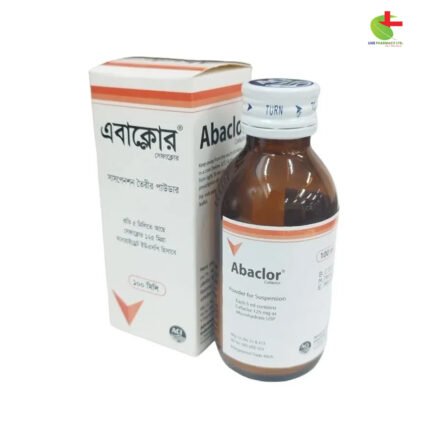Aciphin 2G
320.00৳ Vial(2gm)
- Aciphin Injection is a third-generation cephalosporin antibiotic used to treat a wide range of bacterial infections, including pneumonia, skin infections, UTIs, and more.
- It offers broad-spectrum activity against Gram-positive and Gram-negative bacteria, with a long half-life for once-daily dosing.
- Commonly used for infections such as meningitis, gonorrhea, and sepsis, as well as for surgical prophylaxis.
- Safe and effective for most adults and children over 1 month, but should be used under the supervision of a healthcare provider.
 Brand
Brand
|
ACI Limited |
|---|---|
 Generics
Generics
|
Ceftriaxone Sodium |
 Type
Type
|
IM Injection |
Indications
Aciphin Injection is recommended for the treatment of various bacterial infections, including:
- Lower Respiratory Tract Infections
- Acute Bacterial Otitis Media (Ear Infection)
- Skin and Skin Structure Infections
- Urinary Tract Infections
- Gonorrhea
- Bacterial Septicemia (Blood Infections)
- Bone and Joint Infections
- Meningitis
- Postoperative Infection Prevention
- Perioperative Prophylaxis for Surgical Infections
Use as prescribed by a licensed healthcare provider.
Pharmacology
Aciphin contains Ceftriaxone, a third-generation cephalosporin antibiotic with broad-spectrum bactericidal activity against a wide range of Gram-positive and Gram-negative bacteria. It works by disrupting bacterial cell wall synthesis, making it highly effective in treating various infections.
Ceftriaxone is highly stable against beta-lactamases and has a long half-life of 6 to 9 hours, which allows for convenient once-daily dosing. The drug is not metabolized in the body; approximately 40-65% of a dose is excreted unchanged through urine, while the remainder is eliminated through bile and feces. It is 95% protein-bound, enhancing its effectiveness.
Dosage
- Adults:
The typical dosage is 1-2 gm once a day via intravenous (IV) or intramuscular (IM) injection (or divided doses twice a day).
For specific infections:- Pneumonia, Bronchitis, Skin Infections, UTIs, Septicemia, Bone & Joint Infections, Meningitis: 1-2 gm daily IV or IM (Maximum 4 gm/day).
- Uncomplicated Gonorrhea: 250 mg IM as a single dose.
- Surgical Prophylaxis: 1 gm IV, 30-120 minutes before surgery.
- Infants and Children (1 month and older):
The usual dosage is 50-75 mg/kg once daily, or divided doses twice a day (maximum 2 gm/day for most infections; 4 gm/day for meningitis).
Duration of Therapy: Treatment typically continues for 4 to 14 days, extending longer for complicated infections. Therapy should be continued for at least 2 days after symptoms subside.
Follow the recommendations of a registered healthcare provider.
Administration
- For Intramuscular Injection:
Dissolve 250 mg or 500 mg in 2 ml of Lidocaine HCl 1% or 1 gm in 3.5 ml of Lidocaine HCl 1%. - For Intravenous Injection:
Dissolve 250 mg or 500 mg in 5 ml of Water for Injection, or 1 gm in 10 ml, or 2 gm in 20 ml.
Administer via IV or IM over 2-4 minutes, or by infusion over 30 minutes at concentrations between 10-40 mg/mL.
Note: Test dose administration is recommended to check for patient tolerance before full treatment.
Interactions
No known drug interactions have been reported.
Contraindications
Aciphin should not be used in patients with a known allergy or hypersensitivity to cephalosporin antibiotics.
Side Effects
Aciphin is well-tolerated, but possible side effects include:
- Gastrointestinal: Diarrhea, nausea, vomiting, stomatitis, glossitis.
- Skin: Rash, itching, hives, swelling.
- Hematologic: Eosinophilia, thrombocytopenia, leucopenia, anemia, neutropenia.
- Liver: Elevated liver enzymes (SGOT, SGPT), bilirubinemia.
- CNS: Nervousness, confusion, sleep disturbances, headache, hyperactivity, convulsions, dizziness.
- Rare: Local phlebitis (minimized by slow injection).
Pregnancy & Lactation
The safety of Ceftriaxone during pregnancy has not been established. Use only when necessary. Ceftriaxone is excreted in breast milk; caution is advised for nursing mothers.
Precautions & Warnings
- Anaphylactic reactions can occur, requiring immediate medical attention.
- In rare cases, gallbladder sludge may form but is reversible after discontinuing the medication.
- During prolonged therapy, monitor blood counts regularly.
Use in Special Populations
Aciphin is contraindicated in premature neonates and newborns (up to 28 days).
Overdose
There is no specific antidote. Treatment is symptomatic.
Therapeutic Class:
Third-generation Cephalosporins
Storage:
Store vials in a cool, dry place, below 30°C, away from light and moisture. Keep out of reach of children.













Reviews
There are no reviews yet.